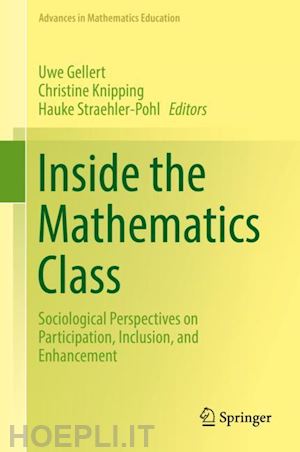
Questo prodotto usufruisce delle SPEDIZIONI GRATIS
selezionando l'opzione Corriere Veloce in fase di ordine.
Pagabile anche con Carta della cultura giovani e del merito, 18App Bonus Cultura e Carta del Docente
This volume is a forward–looking intersection of Sociological perspectives on mathematics classrooms and socio-political perspectives on mathematics education. The first perspective has generated a substantial body of knowledge in the mathematics education. Interactionist research has deepened our understanding of interaction processes, socio-mathematical norms and the negotiation of meaning, generating a ‘micro-sociology’ or a ‘micro-ethnography’ of the mathematics classroom. More recently, socio-political perspectives on mathematics education interrelate educational practices in mathematics with macro-social issues of social equity, class, and race and with the policies that regulate institutionalized mathematics education.
This book documents, strings together and juxtaposes research that uses ethnographical classroom data to explain, on the one hand, how socio-political issues play out in the mathematics class. On the other hand, it illuminates how class, race etc. affect the micro-sociology of the mathematics classroom. The volume advances the knowledge in the field by providing an empirical grounding of socio-political research on mathematics education, and it extends the frame in which mathematical classroom cultures are conceived.
Preface Steven Lerman.- Zooming-In: The Sociological Gaze and the Mathematics Classroom (Uwe Gellert).- The Recognition of Pedagogic Rights in Mathematics Classrooms: A Framework for Reflecting Implicit Normative Assumptions in the Sociology of Mathematics Education (Hauke Straehler-Pohl and Michael Sertl).- Part 1: Enhancement: Facilitating Possible Futures.- Resistance from within the Mathematics Classroom: Silences, Strategies, and Subjectivities (Lisa Björklund Boistrup and Joakim Samuelsson).- “What might really happen?” – Reflections on Implicit Practices and Teachers’ Perspectives in the Context of ‘Realistic’ School Mathematics (Nikola Leufer and Nina Bohlmann).- Language Diversity Builds Mathematics Learning as much as Mathematics Learning Builds Language Diversity (Núria Planas).- Differential Enhancement in Mathematical Pre-School Class Activities (Ola Helenius, Maria L. Johansson, Troels Lange, Tamsin Meaney and Anna Wernberg).- Agency, Materiality, and Mathematics Learning in a Preschool Classroom (Eva Norén).- Part 2: Inclusion and Exclusion in Social Practices.- Racism and Mathematics Education in a Racial Democracy: Views from the Classroom (Luz Valoyes-Chávez).- Storytelling in a Fifth Grade Mathematics Classroom: Matters of Content and Personhood (Kara Jackson).- Deaf Students Learning Mathematics: Interactive Patterns, Participation, and Inclusion (Inês Borges).- Participation in Argumentation (Jenny Christine Cramer and Christine Knipping).- Part 3: Participation in Classroom Culture and Beyond.- Humanizing and Dehumanizing Trends in a Critical Math Classroom (Andrew Brantlinger).- Gendered Positions and Participation in Whole Class Discussions in the Mathematics Classroom (Laura Black and Darinka Radovic).- A Discourse-Based Framework for Identifying Authority Structures in Mathematics Classrooms (David Wagner and Beth Herbel-Eisenmann).- Meta-Rules of Discursive Practice in Mathematics Classrooms from Seoul, Shanghai and Tokyo (Lihua Xu and David Clarke).- Commentary: In Search for Common Ground (Eva Jablonka).
Christine Knipping is Professor of Mathematics Education at the Faculty of Mathematics and Computer Science at the University of Bremen. Her research interests include argumentation and proving, discursive and interactional mechanisms in mathematics classrooms, sociological perspectives on stratification in school and international comparisons.
Hauke Straehler-Pohl is a post-doctoral researcher in Sociology of Education and Mathematics Education in the Faculty of Education and Psychology at the Freie Universität, Berlin. His research interests include social inequalities in the school system, sociology of (pedagogic) evaluation, documentary method, performative approaches to school mathematics, and mathematics teacher education.











Il sito utilizza cookie ed altri strumenti di tracciamento che raccolgono informazioni dal dispositivo dell’utente. Oltre ai cookie tecnici ed analitici aggregati, strettamente necessari per il funzionamento di questo sito web, previo consenso dell’utente possono essere installati cookie di profilazione e marketing e cookie dei social media. Cliccando su “Accetto tutti i cookie” saranno attivate tutte le categorie di cookie. Per accettare solo deterninate categorie di cookie, cliccare invece su “Impostazioni cookie”. Chiudendo il banner o continuando a navigare saranno installati solo cookie tecnici. Per maggiori dettagli, consultare la Cookie Policy.